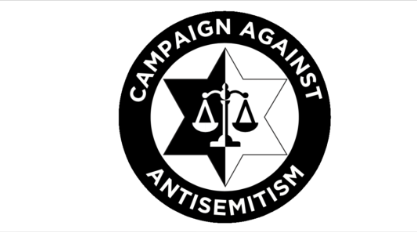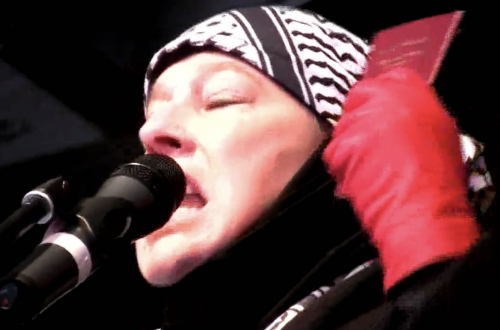Houellebecq’s Soumission, first published in January this year, is now available in English. Set in near future France, it is predicated on the shock rise to power of a polite and charming radical, Mohammed Ben Abbes of the French Muslim Brotherhood party, a man who is willing to reach out to any potential political allies for the sake of unity – as long as they are willing to be assimilated into his vision for France.
Reading this novel – the first by Houellebecq I’ve read – was a strangely unsettling experience. The narrator, François, is a somewhat misanthropic middle-aged academic. Although he contemplates the rise of the Muslim Brotherhood in France with interest and some concern, his main preoccupations are nubile students and the works of J. K. Huysmans.
Houellebecq’s image was on the cover of Charlie Hebdo when gunmen attacked its offices and 13 years ago he was taken to court for provoking racial hatred following comments he had made about Islam. This might lead readers to expect Submission to read like a more cerebral version of Dan Simmons’ unabashedly counter-jihadist sf novel Flashback. But, as many have pointed out, the novel’s relationship with Islam(ism) seems more ironically equivocal than hostile. Malise Ruthven, writing in the FT, distinguishes between superficial judgements of Submission and the actual complexity of Houellebecq’s satire:
His France is so decadent, so lacking in cultural vigour, that it is ripe for an Islamic takeover. It is curious, then, that after the Charlie Hebdo attack, which happened on the very day Soumission was published, the French prime minister Manuel Valls (who seemingly hadn’t read the book) felt obliged to say: “France is not Michel Houellebecq . . . It is not intolerance, hate, and fear.”
The rise of the Muslim Brotherhood is enabled by the equal and opposite rise of the French National Front, still led by Marine le Pen. One strand of the novel is the ironic parallelism between nativism and integrism – both movements are in part inspired by a conservative take on family values. In another theocratic sf novel, The Handmaid’s Tale, Margaret Atwood draws similar links between the anti-pornography impulses of feminists and religious conservatives. But whereas Atwood seems to inhabit a sane and liberal middle ground, it’s not so clear, as we shall see, where Houellebecq himself stands on these issues.
François certainly holds decidedly illiberal views on the position of women.
I’ve never really been convinced that it was a good idea for women to get the vote, study the same things as men, go into the same professions, et cetera. I mean, we’re used to it now – but was it really a good idea?
He seems to see most (not quite all) women in his life as sexual objects, to be enjoyed when desirable and viewed with cold distaste once past their sell-by date. He contemplates the typical ‘Western’ woman, juggling home and career while striving to look good, with contemptuous pity. It’s no surprise that he is quick to see the attractions of a newly available alternative model for domesticity. Looking at a Saudi businessman on the train, accompanied by two young wives, he muses:
“At least he’d have the consolation of two graceful, charming wives to distract him from the anxieties facing the exhausted businessman … What had my father had? My mother, that neurotic bitch.’
Although it might seem that such a thoroughly unpleasant character has been created to enhance the reader’s distaste for the novel’s improbable premise, Houellebecq himself seems to share some of François’ feelings on the matter.
Here’s an extract from an analysis of the novel published on a site which is explicitly aimed at heterosexual male readers:
Far from being Islamophobic, the implication of the novel seems to be that debased western society with its deeply-flawed sexual marketplace would actually be improved by aspects of the faith’s prescripts. It is clear from an interview that Houellebecq recently gave to the Paris Review that his attitudes to Islam have shifted in recent times:
“The Koran turns out to be much better than I thought, now that I’ve reread it—or rather, read it. The most obvious conclusion is that the jihadists are bad Muslims. Obviously, as with all religious texts, there is room for interpretation, but an honest reading will conclude that a holy war of aggression is not generally sanctioned, prayer alone is valid. So you might say I’ve changed my opinion. That’s why I don’t feel that I’m writing out of fear [of assimilation into Islam]. I feel, rather, that we can make arrangements. The feminists will not be able to, if we’re being completely honest. But I and lots of other people will.”
But this is not a book that will please everyone:
We haven’t spoken much about women. Once again you will attract criticism on that front.
“Certainly a feminist is not likely to love this book. But I can’t do anything about that.”
I haven’t investigated this site further, and I doubt I’d like it much, but I find its analysis less troubling than this review in the Guardian. Alex Preston seems keen to reassure readers that the novel is not, after all, Islamophobic. Phew!
Submission is both a more subtle and less immediately scandalous satire than the brouhaha surrounding it might suggest. Rather than being a dark vision of a world ruled by mad mullahs, it presents the moderate Muslims who take over France as a force of spiritual integrity and revolutionary verve, “a historic opportunity for the moral and familial rearmament of Europe”; the real targets of the book are France’s bloated institutions, its venal politicians, its sclerotic literary scene.
This is a novel where women’s opportunities to work and dress how they please are severely curtailed and which presents us with a scene where the narrator goes to dinner with his newly converted colleague to be greeted with the sight of his fifteen year old wife fleeing the room because she is unveiled while an older wife silently brings in the food.
Preston does implicitly deplore the future France depicted by Houellebecq. However it’s troubling that he describes the Muslim Brotherhood as ‘moderate Muslims’, and seems to view criticism of radical Islam as potentially ‘scandalous’ – while apparently thinking France’s ‘sclerotic literary scene’ a thoroughly appropriate focus for grave concern. That phrase ‘the moral and familial rearmament of Europe’ seems presented for our approval, although it’s the kind of language one might expect from the conventional far right – the same far right Preston is anxiously trying to cordon off from Houellebecq in his opening paragraph.
I’m still not sure what to make of Submission, or how to parse its ironies. But that makes it a more interesting, if a less comfortable, read – and it was certainly consistently absorbing.
Update: Although I found the novel most troubling because it ‘makes arrangements with Islam’ (or rather Islamism) that doesn’t mean it couldn’t also serve to whip up anti-Muslim bigotry and fuel support for the far right in some readers (though they’d have to get through the Huysmans stuff first). It’s by no means a precise parallel, but I found myself thinking of The Merchant of Venice which could be said to both encourage and critique antisemitism.


